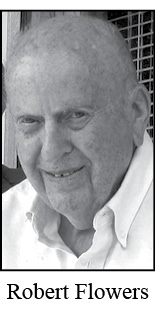Passing of Albany icon, Robert Flowers, brings

By David M. Cross
The recent passing of an Albany icon, local barber Robert Flowers, brought up a discussion in recent days about barbers and barbering in Albany and Clinton County.
Robert Flowers was the dean of the barbering community in Albany, as he began cutting hair in the early 1950s, operating out of a shop behind the Conner (now Branham) Motel and later the New Palace Motel building (later known as Harvey’s) located where Advance Auto Parts is now located.
In 1960, he bought cobbler Blaine Abston’s building and soon moved to that location on the south side of the courthouse square. Ronnie Cook began cutting hair there with Robert in 1980. Robert had not had an occupied second chair since Maloy Guffey quit barbering in 1970.
At the time Robert moved to the square, other barbers in town included Chester Bertram on East Cumberland Street, originally opening a shop in the rear of the Smith Hotel about 1936 and later across the street; Delmer Ringley in the Wisdom Building on South Washington Street; and Ozell Reneau, who barbered at various locations in town as well as at Snow next to Reneau’s Grocery.
Ringley, Reneau, Bobby Riddle and Edsel Beaty all worked with Chester for a time. Edsel Beaty went on to be the executive barber at Ford Motor Company, crediting the fact that he was named for Edsel Ford as creating that opportunity for him to cut the hair of Henry Ford.
Other barbers in town since the 1960s included Jimmy Felkins, located in the basement of McWhorter’s Variety; Danny Groce, who began cutting hair in the Granville Hotel Building in 1969; Dennis Shelley and his son Jerry, and Warren Keefer, who set up shop in the Chilton 5 & 10 building on the north side of the square in 2007.
Actually Albany is a town of barbers, as Byrdstown only recently acquired a barber shop and Burkesville has only two. People such as the Ringley brothers, Cecil Groce, Gary Huddleston, and Bill Byrd took up the trade elsewhere.
Barbering is truly one of the oldest professions. The landmark barber shop in Albany for many years was Crow’s, operated by M.A. (Crow) Brummett. Crow Brummett was joined by Wendell Rector in 1933. Their shop was located at the corner of Washington and Cumberland streets, with the door on Washington Street, where David Cross’ law office is now located.
You could get a shine, a shave, and an education at Crow’s.
Mr. Rector later bought Crow out and he remained at the location until 1960.
Louie Smith, one of the shine boys at Crow’s (every shop had a shine boy) said that Crow and certain fellows would go down to the basement of the building on occasion for five minutes and then come back upstairs. Louie said that he couldn’t understand that for many years, because “there wasn’t a thing in that basement.”
Frank Perdue had a shop on the west side of the Albany square, and barbered for many years. Jess Davidson cut hair on the east side of the town square. Charlie Bowlin,. Millard Jarvis, Wyatt Smith and John A. Craig were also local barbers,
But barbers were not confined to the town of Albany. James and Will Southerland had a barber shop at Highway, at the corner of what is now KY 1351 and the Old Burkesville Road for many years. In other communities, some individual would cut hair out of their home, until licensing requirements came into effect.
These community barbers included Bill Brown at Cartwright, Grady Cross of Shipley, Roe Brumley of Piney Woods, Clayton Savage in Beech Bottom and Sam Simpson and his son Willie Bell Simpson of Fairland. Paul Pennycuff, who ran the store and post office at Seminary, had a routine that haircuts were given by him on Saturday afternoons, at his home next to the store.
Of course many parents would save a quarter and clip their own child’s hair, sometimes with the assistance of the dreaded bowl.
The barber shop was a place not just to get your hair cut, but to learn all about current events. Monumental political discussions were held in the shops, and it seemed likely certain folks were always there, such as the late George Stockton, Bud Sloan, and Johnny Ogden, who were some of Robert Flowers’ regular patrons.
In the seventies, many beauty parlors began cutting men’s hair, and that together with the trend toward longer hair caused a decline in the barbering industry. However, in recent years shorter hair has been the trend, and the traditional place to get a true “high-and-tight” haircut is in the chair of your local barber shop.
The barber shop was, is, and remains the great equalizer. Whatever your station in life, you have to sit and wait until its your turn.
Every head of hair is equal. It’s a place where little boys feel like grown men (unless their mother accompanies them, and then they can only wish). It is a grand institution, and a part of every small town.
We salute the barber shop, and Robert Flowers–one of the “Greatest Generation”, who would drop the clippers and jump on the fire truck as it passed by his shop–and who probably gave more boys their first hair cut than any other man in county history.
history of barbers to mind



